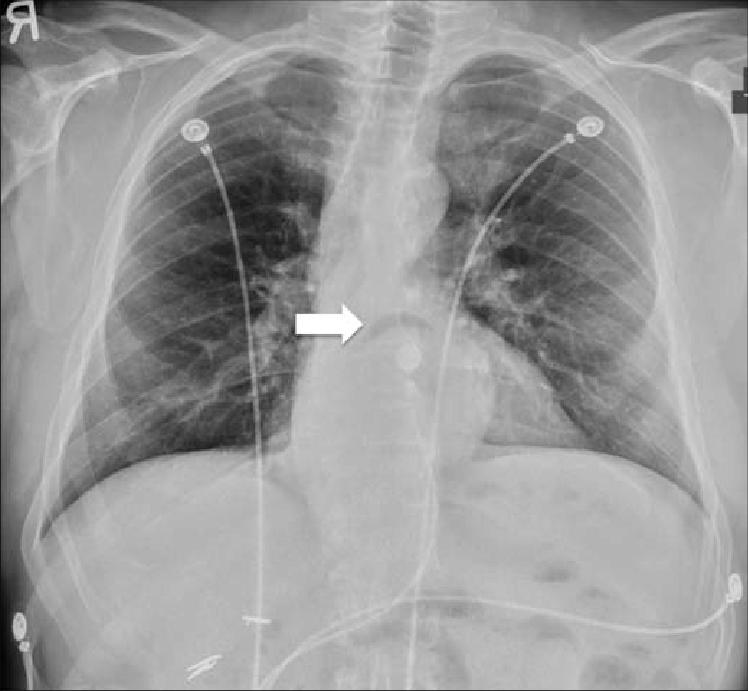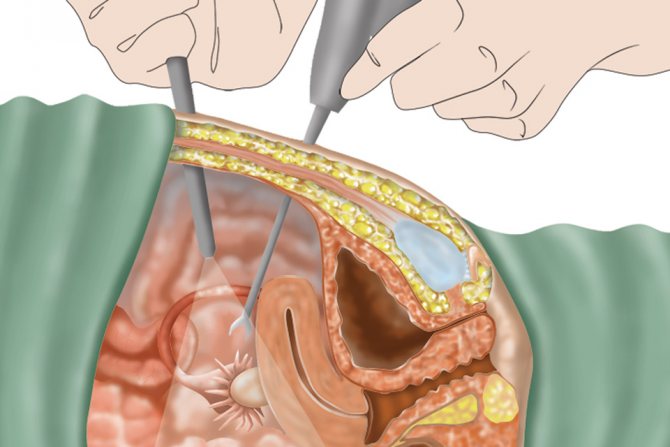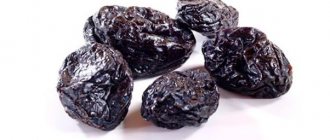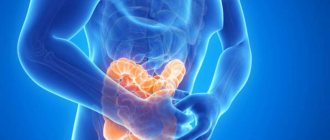Accompanying symptoms
Signs of burning discomfort can be localized in any part of the abdomen or stomach. If previously elderly patients complained about similar symptoms, now they are increasingly bothering young patients, which experts associate with an unhealthy lifestyle and consumption of low-quality products such as fast food or processed foods.
Typically, intestinal burning is not a defining symptom, because it is accompanied by accompanying symptoms, making up a specific symptom complex.
It is problems with the functionality of the gastrointestinal structures that lead to the formation of burning discomfort.
Sometimes such a symptom is the first sign of a developing pathological process, so it is extremely important to contact a specialist in a timely manner in order to diagnose the disease and begin treatment at the very beginning, successfully avoiding complications.
Causes of pain and burning in the intestines
There are many reasons that can provoke a burning sensation in the intestinal area. But such a manifestation is not considered the only one; it always occurs in combination with concomitant symptoms characteristic of a certain pathological condition.
- A burning sensation in the intestinal area may be caused by intestinal irritation syndrome. The pathology today is considered quite common; it occurs against a background of nervous strain, psychological disorders or severe stress conditions. In the process of nervous overstrain, abundant bile secretion occurs. The stomach cannot cope with such an abundance of bile, so it manages to damage the intestinal walls, which provokes a burning sensation in the intestines and diarrhea.
- Appendicitis can also be accompanied by a burning sensation in the intestinal tissues; patients note that with such a problem, a burning and painful sensation radiates to the right half of the abdomen. Appendicitis is characterized by the presence of hyperthermic reactions, nausea, general weakness and vomiting, and sometimes diarrhea. Appendicitis can only be treated surgically; if left untreated, it can burst and lead to peritonitis, sepsis and other complications.
- Also, burning in the intestines can be caused by the presence of Crohn's pathology, which is a chronic disease associated with inflammatory bowel disease. In moments of exacerbation, Crohn's pathology is manifested by intestinal burning, diarrhea and flatulence. Crohn's disease occurs, according to doctors, in a hereditary way.
- It is possible that intestinal burning may occur with a pathology such as dysbacteriosis. The disorder, in addition to burning, is accompanied by symptoms such as diarrhea and weakness, headaches and bloating, and pain in the lower abdomen. In fact, dysbiosis is an imbalance in the intestinal microflora, causing irritation of the intestinal walls and their inflammation.
- Intestinal infections of viral, fungal or bacterial origin can also occur with a characteristic burning sensation in the intestines. After it, other signs of infection appear, such as diarrhea, nausea and aversion to food.
- Cancerous tumors, oddly enough, can also occur with a burning sensation in the intestinal structures. But it is impossible to determine oncology without carrying out appropriate diagnostic procedures. You need to urgently undergo an examination, because even cancer can be defeated if you start treating it at an early stage.
- Sometimes a burning sensation in the intestines occurs against the background of adhesions in the peritoneal cavity. They usually occur as an adverse consequence of surgery in this area.
- There have been cases when a burning sensation in the stomach and intestines occurred during pregnancy. It’s just that hormonal changes in the patient’s body affect gastrointestinal activity. In some cases, girls notice disturbances in the functioning of the intestines already from the first week after conception, which are manifested by burning, constipation and painful symptoms.
These are not all the reasons, because each organism is individual. A variety of diseases can manifest differently in patients.
All of the factors described above can provoke a burning sensation in the intestines after eating, i.e. inflammation of the intestines, appendicitis and adhesions, Crohn's disease, irritable bowel syndrome, etc.
Also, a burning sensation causes such a dangerous condition as peritonitis. Inflammation of the peritoneal cavity is a very serious condition that occurs against the background of traumatic injuries, chemical exposure, infectious lesions, etc.
In addition to pronounced hyperthermia, with pancreatitis, patients experience sharp pain and burning in the intestines and abdomen, cutting painful attacks. With such symptoms, the patient must be urgently hospitalized for emergency medical care.
Burning inside the abdominal cavity. Irritable bowel syndrome, causes, treatment
Intestines
Our body often gives us hints so that we can eliminate problems in a timely manner. Symptoms such as a burning sensation in the esophagus can be disturbing, regardless of age or gender. Very often, discomfort in the esophagus is accompanied by belching and an unpleasant taste in the mouth.
In addition, there are additional symptoms that may indicate a stomach disorder. In all cases, the pain should not be tolerated; treatment must be carried out immediately, otherwise the disease may become more severe.
Diagnosis and consequences
In order to make a correct diagnosis, the doctor prescribes an examination.
What procedures need to be completed during the examination:
- Gastroscopy.
- X-ray of the stomach.
- Examination of blood for the presence of excess organisms.
- Analysis of gastric juice acidity.
- Less often - checking for worms and E. coli.
If you do not consult a doctor in time, then seemingly harmless symptoms of burning in the esophagus and stomach can develop into serious illnesses, such as:
- Ulcer.
- Chronic gastritis.
- Pancreatitis.
- Stomach bleeding.
One of the most serious diseases that can be caused by exposure of the gastric mucosa to constant large amounts of acid or bile is malignant neoplasm.
If you consult a doctor in a timely manner, the tumor can be cured, but if the disease is advanced, then surgery will no longer be possible.
Therefore, if your stomach is burning, you should immediately pay attention to it and go to the doctor.
Others
The stomach often burns due to heart disease, angina pectoris, pleurisy, myocardial infarction, and also with increased blood pressure.
If the disease is caused by heart disease, its symptoms are relieved by taking nitroglycerin. But after this, it is better to contact a cardiologist and tell about the alarming symptoms.
A burning sensation in the esophagus often appears due to stress and nervous conditions. In the modern rhythm of life, a person is constantly faced with problems and nervous shocks, which provokes a burning sensation in the esophagus and stomach. Only careful treatment of your nerves will help you cope with this problem.
When taking medications, you need to be careful, as some of them can cause unpleasant symptoms and discomfort. When a doctor prescribes medications that cause hormonal changes, he also prescribes antacid therapy.
Sometimes the burning sensation can be caused by bacterial infections. Once bacteria enter the body, they weaken its barrier functions. Due to such infections, changes occur in the mucous membrane, and ulcers and gastritis appear.
Pregnant women quite often encounter discomfort, as hormonal disruption occurs, the uterus enlarges, and the woman feels pain and heaviness after eating.
The main enemy of the body is alcohol and smoking. They have a bad effect on the entire body, and with stomach diseases, the patient’s condition only worsens. Therefore, you need to give up bad habits.
Treatment
Often, a burning sensation in the stomach and esophagus appears due to increased acidity in the gastric juice. To eliminate the disease, the doctor prescribes medication.
Important! When prescribing medications, the gastroenterologist takes into account all the characteristics of the patient’s body and the course of the disease. In order for the doctor to quickly identify the disease, you need to tell him about all the manifestations of the disease.
For different cases, the gastroenterologist prescribes different drugs. In addition to medications, a strict diet is required. This is done to normalize metabolism in the body. You need to remove from your diet all foods that can cause flatulence or fermentation processes in the digestive organs.
- Dairy products.
- Vegetable soups.
- Porridge.
- Dietary broths.
- Some vegetables and fruits.
- Dietary boiled meat.
What you need to remove from your diet:
- Drinks containing alcohol and gases.
- Fatty dishes and broths.
- Pickled vegetables.
- Canned food.
- Sweets.
- Fresh baked goods.
- Sausages.
It is recommended to eat at certain times and in small portions. You should stop eating on the go. In order not to encounter symptoms of burning in the stomach and esophagus, you need to adhere to certain rules:
- You should not eat or drink before bed.
- There is no need to buy tight clothes, if they tighten the stomach, this will have a bad effect on its work.
- You should not go to bed immediately after eating; you need to walk or sit for a while, do something.
- It is recommended to sleep on a pillow so that your head is always slightly higher than your torso.
A burning sensation in the esophagus can be relieved if you follow simple rules and adjust your diet. It is recommended to give up bad habits, this will help improve the patient’s health. You can relieve a strong burning sensation in the stomach using traditional methods:
- A remedy that relieves symptoms in almost everyone is to add a teaspoon of soda to a glass of boiled water. The solution should be drunk in small sips. Instead of water, you can drink a glass of milk or chamomile tea.
- Potato juice is also popular to relieve burning sensation in the esophagus. Helps in the treatment of chronic gastritis. This juice can be drunk not only to treat the disease, but also for prevention.
- If the burning sensation occurs frequently, in addition to the medications prescribed by the doctor, you should add crushed buckwheat to your food.
- There are finely ground walnut kernels, you can take no more than 1 tablespoon per day.
- Chew the grains of oats or barley for a long time, at least half an hour, swallow the saliva and spit out the grains.
- There are dry peas.
- There are also remedies: infusion of St. John's wort, apple cider vinegar, burnt magnesia - all of these can treat the disease.
In addition to these remedies, the burning sensation in the esophagus area will be removed by herbal decoctions and mixtures made from them. There are several recipes that will help get rid of the disease, but it is better to consult a gastroenterologist before use, since herbal remedies can be harmful if the concentration is incorrect.
- Finely grind the potato flowers and brew tea from the resulting mixture.
- Chew the calamus roots thoroughly and wash it down.
- Pour hot water over gentian root, heat over low heat for 6-7 minutes, let steep for 30 minutes, strain and drink. You need to take the decoction 3 times a day.
- Pour gentian root with a small amount of vodka and leave to infuse for 3 weeks; drink 2 teaspoons of the product before each meal.
- Pour a small amount of centaury herb with hot water and leave in a thermos overnight. Take in small portions, no more than a tablespoon before meals.
All these remedies have a positive effect on the stomach, actively fight flatulence and remove toxins. Traditional methods help get rid of the symptoms of the disease, but do not cure the cause (focus), therefore, if attacks appear constantly, you need to make an appointment with a gastroenterologist.
To treat a burning sensation in the stomach, the cause of which is unknown, the patient needs to visit a gastroenterologist. He will order an examination and diagnose the disease, since there are many pathologies with similar symptoms, from the most harmless to the serious.
In order to cure the condition when the stomach bakes, many medications have been developed, but only a gastroenterologist can prescribe them correctly.
Medicines
A burning sensation in the esophagus occurs if a person experiences excessive secretion of hydrochloric acid. This means that the doctor, when prescribing a course of therapy, tries to reduce the acidity of gastric juice.
What a gastroenterologist can prescribe:
- Antispasmodics are medications that reduce pain during stomach cramps.
- Drugs that reduce gastric acidity.
- Alginates – they help create a protective lining for the gastric mucosa.
- Enzymes that will help with digestion.
- Probiotics and prebiotics.
Important! If you have a burning sensation in your stomach, you should not prescribe medications without visiting a gastroenterologist. The course of therapy should only be prescribed by a specialist. We must remember that timely and properly selected treatment will help you recover faster.
In addition to medications, a gastroenterologist can prescribe alkaline mineral water, but you must drink it strictly according to the regimen provided by the doctor.
Unpleasant sensations in the stomach, burning sensation periodically bother every person. Such symptoms may appear after eating, emotional shock, or during an exacerbation of certain diseases.
You should not ignore these sensations or self-medicate, as this can harm your health.
Only a doctor can determine why there is a burning sensation in the stomach, what causes it, but not ordinary heartburn.
Diagnostics
Diagnosis of intestinal burning comes down to studies like:
- Ultrasound diagnostics of abdominal organs;
- Colonoscopy;
- Laboratory analyzes of biomaterials such as blood, feces, urine;
- X-ray studies;
- MRI or CT;
- If necessary, a biopsy is taken;
- Feces are examined for parasites;
- A coprogram is carried out, etc.
The list of diagnostic procedures is determined by the doctor depending on the specific clinical picture of the patient.
Treatment
Therapy for burning intestines also depends on the cause that caused it. If an uncomfortable burning sensation is provoked by a woman’s interesting position, then you can get by with a simple adjustment of the diet, excluding from it some foods that especially irritate the intestines and disrupt its activity.
Dysbacteriosis burning sensation is treated comprehensively with the prescription of prebiotics and probiotics, antiseptics and immunostimulants. Specialized diet therapy is prescribed.
If the burning sensation is associated with Crohn's pathology, then the therapy is individual. If the pathology is mild and practically does not worsen, then you can get by with taking anti-inflammatory drugs exclusively. In case of severely aggravated syndrome, hormonal and antibacterial therapy, immunosuppressants, etc. are indicated.
In general, to eliminate burning in the intestinal area, it is necessary to eliminate the factors that provoke it, and since most often they are of a pathological nature, treatment requires an integrated drug approach with diet therapy.
Prevention
To prevent burning in the intestines, you need to follow the simplest recommendations, which are as follows:
- It is necessary to strictly follow hygiene standards;
- Do not frequently get carried away with taking laxatives;
- You need to lead an active life, and ideally, engage in some kind of sports, because an active lifestyle helps improve intestinal motility;
- Try to take antibiotic drugs only in special cases and as prescribed by a doctor;
- Adjust your diet, food should be healthy and rational, without harmful foods;
- If any pathological signs of damage to the gastrointestinal tract arise, then it is necessary to consult a doctor for treatment; it is unacceptable to ignore and neglect the pathology;
- If you have a desire to defecate, you cannot restrain the urge;
- Unhealthy habits need to be eradicated.
Do not forget about the generally accepted drinking rule, which requires drinking at least 1.5-2 liters of ordinary water per day.
Self-medication is unacceptable in any situation. Only a gastroenterologist will be able to understand the true source of the problem, the causes of burning and select the most effective therapy. You can mistakenly mistake burning discomfort for a gastrointestinal disease, but in reality the source of the problems will be localized in the genitourinary system, reproductive organs, etc.
Intestinal pain, how to treat it with diets, pills and folk remedies
Since the intestines are a large organ, pain can be localized in various areas of the abdomen: in the epigastric region, in the navel area, in the lower part.
Dislocation of pain is one of the most important indicators that helps to establish the cause of the condition.
In addition, the nature of the pain can be different, there are:
- spicy;
- stupid;
- cramping;
- wavy;
- aching.
Each disease has its own manifestations of pain.
In addition to bowel pain, additional symptoms may occur, such as:
- nausea, vomiting;
- diarrhea;
- constipation;
- impurities of mucus, blood, pus in the stool;
- weight loss;
- unpleasant itching sensation in the anus;
- bloating;
- belching;
- unpleasant taste in the mouth;
- temperature increase.
Diarrhea as an additional symptom
The pain may come suddenly or last for some time, which is also an important indicator.
The causes of pain in the intestines can be both pathological and non-pathological factors.
The latter include: overeating, abuse of junk food, ordinary poisoning, poor diet, and starvation. In such cases, it is enough to normalize the diet so that the intestines work correctly.
Pathologies include the following problems in the intestines:
- inflammation of the appendix;
- dysbacteriosis;
- irritable bowel syndrome;
- ulcerative colitis;
- diverticulitis;
- gurgle;
- ischemic colitis;
- helminthic infestation.
Traditional medicine recipes
Before you start using alternative medicine, you should conduct a thorough examination of the inflamed organ and obtain a diagnosis.
If the conclusion allows you to use traditional medicine to treat the problem, then you can choose a method of therapy for a specific case.
Traditional recipes are good for pregnant women and people who are contraindicated in taking synthetic drugs. In addition, they are quite economical and their use does not cause side effects.
It is necessary to keep in mind the individual intolerance of certain substances by the body of a particular person.
Cleansing the body
Before you heal your intestines at home, you should cleanse your digestive system. People with chronic diseases of the digestive system should not carry out self-cleansing of the body. The following cleansing methods are popular:
- Infusion of flax seeds. A tablespoon of seeds should be poured into half a glass of warm water and left for 2 hours. After this, add half a glass of oil to the infusion, stir and drink before meals. The course of cleansing is 7 days.
- Oatmeal decoction. A glass of oatmeal should be poured into 2 liters of boiled water and the mixture should be left to steep for 24 hours. After this, put the pan on the fire and cook the jelly for an hour. After this time, the broth should be cooled, filtered and drunk all day, replacing food with it. In addition to jelly, only water is allowed on this day. After such a fasting day, you should take a break of 5 days, after which you can repeat the process again, gradually increasing the duration of cleansing with oatmeal jelly to four days.
Elimination of irritable bowel syndrome
With this disease, treatment of the intestines with folk remedies is even more effective than therapy using drugs. Most often, tea or herbal infusions are used as a life-saving elixir:
- Mint infusion to reduce gas formation and relieve cramps. In a cup of boiling water, infuse a spoonful of mint leaves. The infusion should be drunk 2 times a day, half a glass, an hour before meals.
- A remedy for eliminating spasms and normalizing digestion. Infuse a spoonful of dill seeds in 200 ml of boiling water for 2 hours. To treat the intestines, you need to drink ½ glass of the infusion three times a day.
- Dry sage elixir for diarrhea and vomiting. A tablespoon of the herb should be brewed in boiling water (3 cups) and left for an hour, then drink a glass of the product three times a day.
- Kefir with vegetable oil for constipation. You need to add a spoonful of oil to a glass of kefir, stir and drink the mixture before bed.
- As a remedy for constipation, you can eat baked apples, dried prunes, and drink a spoonful of olive oil in the morning before meals.
- Infusions, decoctions and alcohol tinctures on oak bark help well against diarrhea.
Treatment of dysbiosis
The fight against this disease, which disrupts the intestinal microflora, occurs in three stages. Toxins are removed, pathogenic bacteria and fungi are removed, and the natural balance of microorganisms is restored:
- Treatment of the intestines with herbs: the best remedy for restoring microflora. St. John's wort, chamomile, lemon balm, and flaxseed should be taken in equal proportions, crushed and mixed. After this, you need to leave a spoonful of this mixture in two glasses of boiling water for 24 hours. Drink a glass of the composition on an empty stomach 3 times a day before meals for 7 days.
- Aloe with wine to combat dysbiosis. To prepare the product, grind 100 g of aloe using a meat grinder, place in a glass jar, add 200 g of granulated sugar, close and leave to infuse for 3 days. After this time, pour 200 g of red wine into the mixture and leave for another 24 hours. You can treat the intestines by taking the prepared elixir, a tablespoon three times a day before meals (half an hour).
Therapy for peptic ulcer
With a duodenal ulcer, excessive formation of hydrochloric acid occurs, resulting in pain, often radiating to the back, shoulder blade and heart. The disease also manifests itself in the form of heartburn, nausea, high gas formation, constipation, and weight loss often occurs.
- Infusion of sea buckthorn oil and propolis. Infuse propolis powder in half a glass of oil for half an hour. Add a few drops of tocopherol solution (prepare in a ratio of 1:10), mix and put in a dark place. Take the elixir three times a day, a teaspoon.
- Licorice decoction. Grind licorice root (10 g) and orange peel (6 g), pour half a glass of boiling water over them. Place the mixture on the stove and evaporate until half the original volume remains. Add honey in an amount of 50 g. Drink the resulting product in equal parts three times during the day. The course of taking the elixir is 30 days.
- For peptic ulcers, it is also useful to drink half a glass of potato decoction (without salt) or cabbage juice three times a day before meals.
Treatment of colitis
This disease, affecting the large and small intestines, is accompanied by damage to the mucous membranes of these diseased sections. Symptoms of colitis include pain in the navel, bloating, loss of appetite, and frequent urge to defecate. In mild forms of the disease, you can treat the intestines at home using folk remedies.
To treat chronic colitis, you can use a mixture of herbs, which includes: yarrow, sage, mint, oregano, plantain, shepherd's purse, St. John's wort, knotweed. You should also add caraway seeds, valerian root, chamomile flowers and blueberries. It takes an hour to infuse two tablespoons of herbs in a glass of boiling water. You need to drink half a glass after meals.
Source: https://bugmk.ru/zabolevaniya/bolyat-kishki.html
Causes of burning sensation in the stomach
The stomach is lined with mucous membrane, the cells of which produce mucin (mucus), which is protective. Mucus covers the walls of the stomach to a thickness of 0.5 mm. It not only prevents pathogens from entering, but also protects the stomach from aggressive hydrochloric acid and pepsin, which the stomach itself produces. Otherwise, the stomach wall would begin to digest itself. Thus, a burning sensation in the stomach is a consequence of a violation of the acid-base balance (acid-base balance) in the acidic direction.
To digest food, you need, first of all, hydrochloric acid and the enzyme pepsin. Their mixture is very aggressive, so much so that it is capable of breaking down any organic substances. Normally, hydrochloric acid is produced exactly as much as is needed to digest the food bolus.
The walls of the stomach could also be burned by this mixture, if not for the protection of mucin in the mucous membrane. The esophagus is also lined with mucous membrane, but it has no protective properties.
Why can a burning sensation in the stomach after eating bother a person? If the gastric mucosa is damaged by any aggressive irritating factor, its protective functions are lost.
In such cases, aggressive damaging factors are able to penetrate deep into the wall of the stomach with subsequent damage. This phenomenon easily causes an uncomfortable burning sensation in the stomach immediately after eating.
What food can be wrong for the stomach?

Harmful to the stomach:
- Foods high in fiber begin to act like sandpaper, injuring the mucous membrane. Among such products are the beloved bran bread, some vegetables (beets, raw cabbage) and fruits.
- A burning sensation in the stomach after eating can also be caused by pickles, smoked foods, marinades, spicy and fried foods. Many of these products contain carcinogens, acids, trans fats and other harmful substances.
- Fermented milk products with high acidity often cause a slight burning sensation in the stomach after eating.
- Sour fruits such as citrus fruits.
- Long-term abstinence from food has a detrimental effect on the mucous membrane.
- Foods that are undesirable for the stomach include any alcohol, fast food, soda, and chips.
- Also, the cause of a burning sensation in the stomach after eating can be due to nervous strain, frequent stress, taking drugs with an irritating effect - aspirin, NSAIDs, antibiotics before meals, iron, potassium supplements, etc.
- Provoking factors include excess weight and smoking. In obesity, the stomach is surrounded by fat, which slows down the process of breaking down food and its absorption. Therefore, burning in the stomach and esophagus after eating is a constant symptom in obese people.
However, that's not all. Pain is added to the above symptom. A burning sensation in the stomach after eating provokes many unpleasant symptoms. A vicious circle is formed, and the destruction of the mucous membrane continues to progress and deepen if measures are not taken. Besides everything, it is very harmful to overeat, especially at night.
Other causes of burning in the stomach after eating:
- bacterial infections (in 90% of cases it is the Helicobacter bacterium);
- hormonal imbalance;
- food that is too cold or hot;
- instant strong coffee;
- irregularity of food intake;
- diaphragmatic hernia;
- diseases of the stomach itself with high acidity - ulcers and gastritis;
- oncological formations;
- bad ecology;
- poor quality water;
- lifting weights;
- pregnancy (especially in the last trimester, when the enlarged uterus begins to put pressure on the stomach).
Treatment and recovery
For painful, intense or chronic cases of burning diarrhea, several home remedies can help reduce symptoms without disrupting the immune process.
Diarrhea usually causes fluid loss, so increasing your fluid intake can help prevent dehydration.
Drinking more water during diarrhea may be helpful, but it is also important to replace salt and sugar with products such as salt and diluted juice.
An alternative is oral rehydration solutions containing electrolytes, which can be purchased at most pharmacies and online.
A person should also try eating soft foods such as toast, rice or bananas if they have symptoms of diarrhea. Dense carbohydrates can help make stools harder.
Yogurt can also help restore the natural balance of gastrointestinal flora, or microbes, after diarrhea.
A person with burning diarrhea should also:
- Avoid spicy foods or food allergens.
- be as careful as possible when wiping
- Rinse the area with warm water and unscented baby wipes.
- sit in a warm bath with epsom salts.
- Avoid dehydrating foods such as caffeine or alcohol.
- avoid tobacco
- Apply water-repellent cream or ointment to the affected area.
- avoid foods high in sugar or fat
- Use over-the-counter hemorrhoid creams.
- use over-the-counter pain relievers.
- use probiotic supplements
Symptomatic manifestations

A burning sensation in the stomach may be accompanied by morning sickness, pain that radiates to the back, and belching with burning of the throat mucosa. One of the most common symptoms is a metallic smell from the mouth. If your stomach burns after eating, the cause may be an ulcer or gastritis.
In these pathologies, the mucous membrane is already damaged. When an additional portion of acid or bile hits it, pain occurs, perceived as a burning sensation. This is especially true during hunger.
If the pain in the side is accompanied by a burning sensation in the stomach, this is often a consequence of ulcers or gastritis, tumors. Then the pain radiates to the back or ribs. Esophagitis also gives pain and a burning sensation in the esophagus and stomach.
Symptoms of stomach pain
Severe stomach pain is considered a clear sign that you have problems with the gastrointestinal tract. In addition to diarrhea, patients exhibit accompanying symptoms:
- Gastrointestinal tract disorder.
Many begin to experience diarrhea, and among the people, diarrhea, which indicates indigestion. Diarrhea is caused by various factors. Intestinal upset continues several times a day. If this process lasts more than two days, then the patient begins to develop chronic diarrhea.
- Nausea and vomiting.
Sometimes these symptoms are accompanied by bloody discharge. The patient feels sharp cutting pain in the stomach area.
- Temperature increase.
When an infection affects the body, patients experience an increase in temperature. This indicates a serious infectious pathology
- Lack of appetite.
This symptom is caused by gastritis and ulcers. With such diagnoses, the patient feels a cutting pain in the stomach.
- Bad breath.
This symptom indicates liver problems. It is worth introducing plenty of fluids. A nutritionist will prescribe an individual diet for you to stabilize your body.
- Bloating or flatulence indicates disturbances in the gastrointestinal tract.
Heartburn
Heartburn is accompanied by a burning sensation in the gastric cavity almost always, regardless of etiology. Why does there be a burning sensation in the stomach after eating? For a more precise diagnosis, simply observe when exactly the burning sensation occurs. If it appears immediately after eating, most often it indicates gastritis. By the way, half of the world's population suffers from this disease.
With gastric ulcer (stomach ulcer), pain appears on an empty stomach or some time after eating. If a burning sensation occurs in the morning or evening, with pain in the epigastrium or on the right, most likely it is a duodenal ulcer.
Why do they appear
Burning in the stomach
According to its etiology, abdominal burning is caused by various factors. In particular, the area where the gastrointestinal tract is located often suffers.
Poor functioning associated with:
- With genitourinary systems
- Epidermis.
- Cardiovascular abnormal regimen.
- Nerve cells.
- Pregnancy.
Expectant mothers may experience sensations that are very unpleasant.
They feel discomfort, which is aggravated by a burning sensation in the upper or lower abdomen. It is possible that such a feeling may occur at the bottom of the anterior wall in the abdominal cavity.
Women feel a burning sensation in the right side of the lower abdomen and in the left side when there is a threat of ectopic pregnancy. If a burning sensation of a paroxysmal nature is detected, then pain appears in the lower back, legs, and rectum. The disease manifests itself in the form of poor urination, defecation, and diarrhea.
Or, when revealed:
- Endometriotic painful lesions.
- Filling of the ovaries with fluid and their protrusion.
- Rupture of structural follicular components in the ovaries.
Diagnostic measures

For diagnosis it is necessary to undergo a number of studies:
- X-ray of the stomach is the first and safest method. It has no contraindications. The method is informative because it allows you to see an ulcer in the early stages, various deviations in the shape of the stomach, its external changes, as well as neoplasms.
- EGDS is the most modern, fastest and most popular diagnostic method. The mucous membrane is completely visible. Comprehensive information about the condition of the esophagus, stomach and duodenum is provided. The examination is carried out quite quickly, but has contraindications.
- A study of gastric juice is necessary because a burning sensation in the stomach after eating is always associated with an increase in acidity. The study can accurately determine the composition, acidity and pH of the juice and its deviations from the norm.
- Analysis for the presence of infection - we are talking about Helicobacter pylori. In 90% of cases it is the cause of stomach disease. Basically, a breath test is performed to check for the presence of Helicobacter pylori. A gastric biopsy may also be performed if cancer is suspected.
Possible complications

Ignoring a burning sensation in the stomach for a long time leads to changes in the mucous membrane, and the inflammatory process begins. If even after this treatment there is no treatment, the inflammation of the mucous membrane becomes chronic, spreading not only in depth, but also in breadth, covering a large area.
In addition, inflammation can spread to neighboring organs, including the duodenum, gallbladder and pancreas. This is already advanced chronic gastritis. Erosion of the mucous membrane is replaced by a stomach ulcer.
What else do severe cutting pains in the stomach indicate?
Pain in the stomach indicates a malfunction of the esophagus. Among them: liver disease, hepatitis, cholelithiasis, cholecystitis, inflammation of the gallbladder. If the location of the pain cannot be determined, then the symptoms are associated with neoplasms.
When the first complaints appear, we advise you to contact a gastroenterologist. The doctor will help heal the body as quickly as possible. An accurate diagnosis is established after undergoing examinations and tests. Self-diagnosis at home is impossible.
Special diet

In fact, the healing process begins with it. Otherwise, you should not count on the success of therapy. Typically, treatment for a burning sensation in the stomach after eating begins with diet correction: excluding smoked meats, baked goods, fried and fatty foods, soda, canned food and sausages, alcohol and marinades, coffee, chocolate and sweets, chips, salted nuts, spicy foods, and constant use of chewing gum. In other words, all products that cause fermentation and increased gas formation are completely excluded.
During treatment, the basis of the diet should be vegetable soups and chicken broths, water-based porridge (the healthiest is oatmeal) and steamed vegetables, non-acidic and not too sweet fruits.
Meals should be fractional, in small portions. Eating dry and on the go is not your option.
The list of recommended products includes:
- fresh fermented milk products;
- slimy soups;
- casseroles, steam omelettes, salads, greens, baked vegetables and fruits;
- boiled or stewed meat, fatty meat is excluded.
- Turkey, chicken, rabbit and veal are recommended.
Medicines

Classification of the means used:
- Proton pump inhibitors, or PPIs, are drugs that inhibit the production of hydrochloric acid.
- H2-histamine receptor blockers are also aimed at ensuring that less hydrochloric acid is produced. They disrupt the functioning of parietal cells, which produce acid.
- Acid regulators are all kinds of antacids.
- There is also detoxification therapy - the use of Smecta and activated carbon.
- Antacids - they reduce acidity and have an enveloping effect. Among them are “Maalox”, “Venter”, “Almagel”, “Phosphalugel”, “Alfogel”. These drugs are the basis of the medication group.
- Antisecretory drugs - help reduce the production of hydrochloric acid, for example, Omez, Omeprazole, Ranitidine, etc.
- Enzyme agents do not allow fermentation and putrefactive processes to develop - “Festal”, “Mezim”, “Pancreatin”, “Panzinorm”, “Bisacodyl”, “Creon”, etc.
- In addition, the feeling of baking in the stomach can be caused by the effect of acid on the walls themselves, then alginates are used. Alginates are drugs that prevent acid from affecting the wall of the stomach itself.
The doctor often prescribes Omez, Gastal, Rennie, Festal, and Gaviscon. Since the walls of the stomach and mucous membrane are damaged during burning, they need to be restored faster.
To speed up regeneration, Misoprostol is used, which increases mucus production, and Sucralfate increases its protective functions. Prokinetics (Ganaton, Motilium) normalize motor skills.
Gastroprotectors (Novobismol, Venter, Keal, Sukras, Trimibol) protect the gastric walls from irritating factors.
To relieve spasms, antispasmodics “Papaverine”, “No-Shpa”, “Spazmalgon” are used.
To restore the intestinal microflora, pro- and prebiotics “Hilak Forte”, “Maxilak”, “Bifiform” and “Linex” are required.
If Helicobacter pylori is present, antibiotics “De-Nol”, “Amoxicillin”, “Clarithromycin”, and the antimicrobial drug “Metronidazole” are prescribed.
Treatment with traditional methods

Folk remedies are used in the form of juices, infusions, decoctions, oils and are an addition to the main therapy:
- Baking soda solution – 1 tsp. per glass of water. Many people use it for burning stomach and heartburn. Yes, indeed, in the first moments, soda, as a weak alkali, will reduce the burning sensation in the stomach and neutralize excess hydrochloric acid. But then the picture changes. This method is as popular as it is harmful. After a short-term reduction in heartburn, it returns after some time with renewed vigor, but in higher concentrations. Baking soda for heartburn and hyperacid gastritis is the shortest path to getting an ulcer. There are much safer remedies - warm milk, still alkaline mineral water, chamomile tea.
- Swamp calamus root - used in dry form: a pinch must be chewed and swallowed.
- In addition, you can take a decoction of calamus root; a decoction of St. John's wort is also very useful. They are drunk before meals.
- Activated carbon will be useful after a feast, as it will reduce intoxication. 1 tablet of coal is mixed crushed with a quarter glass of water.
- Potato juice is good for removing high acidity. This is the most popular folk remedy for the treatment of high acidity. Grate the potatoes, squeeze out the juice through cheesecloth and drink half an hour before meals. It is taken 4 times a day. It significantly improves the patient’s condition within 2 weeks – heartburn and pain go away. Carrot juice also works.
- Salt solution - a pinch in a glass of water will reduce the burning sensation.
- Buckwheat – it is also taken in dry form for a burning sensation in the stomach. It should be crushed and well sifted. Pinches are taken three times a day.
- Poplar charcoal - it is also taken in crushed form before meals and washed down with water.
- Among medicinal herbs, we can also recommend infusion or juice of plantain, infusion of licorice root, string, celandine, aloe juice, sea buckthorn oil, olive oil, flax seed, onion juice, cabbage juice - taken daily, several times a day before meals.
- Bee products – honey water, propolis.
It should be remembered that folk remedies do not remove the cause of the disease, they only improve the patient’s condition. It is impossible to cure the stomach with folk remedies. They are beneficial as a supplement. The main treatment is prescribed only by a gastroenterologist.
Causes of abdominal pain and diarrhea
Experts identify a number of main causes that cause abdominal pain and diarrhea.
- Gastrointestinal disorders
In this condition, a person experiences severe pain. To understand all the possible causes, it is necessary to establish the intensity of stomach pain, their frequency and nature. This data will help establish accurate diagnoses and exclude other diseases;
- Gastritis
Diarrhea and cutting pain in the stomach are observed on an empty stomach or after eating, and patients also suffer from vomiting and heartburn. Such symptoms indicate gastritis. If you start this process and do not go to the clinic in time, then gastritis can develop into a duodenal ulcer. Gastritis with low acidity and gastritis with high acidity are classified. The disease is diagnosed only through tests and diagnostic examinations.
Therefore, to avoid pain and worsening of the condition, contact a medical professional who will prescribe you the correct treatment and select a diet. An endoscopist and gastroenterologist will help establish an accurate diagnosis.
- Duodenal ulcer
This is one of the possible causes of diarrhea, flatulence and stomach pain. This disease appears due to poor diet, consumption of alcohol, fried, fatty and starchy foods. Unpleasant sensations and heartburn during an ulcer occur some time after eating. Pain syndrome occurs no later than an hour and a half after eating.
- Cholecystitis
A cutting pain in the right hypochondrium indicates inflammation of the gallbladder.
Other causes of stomach pain and diarrhea:
- Low immunity
With a weakened immune system, a person begins to have problems with the stomach and other body systems. These processes occur most often in spring and autumn, when the immune system is weakened and the body is susceptible to colds and illnesses.
Patients suffer from vitamin deficiency. A patient with a weakened immune system should regularly visit an immunologist. He will prescribe treatment, a suitable diet that will improve the gastrointestinal tract. Patients are prescribed homeopathic treatment. It is effective.
- Excessive exercise
Strong physical activity, overwork and lack of adequate sleep will immediately affect the gastrointestinal tract, complexion and other organs.
- Emotional trauma and stress.
All emotional stress negatively affects the functionality of other organs, and the stomach is no exception. Many people experience upset and diarrhea from stress and anxiety.
- Eating disorder.
The cause of stomach pain is the food itself that you eat. At the first manifestations of pain syndromes, you need to change your menu. It is necessary to pay attention to the connection between pain and food intake and the nature of the food taken. You should add fruits and vegetables, meat and fish, as well as foods rich in vitamins and minerals to your diet. You will protect your stomach from diseases and strengthen your entire body.
Prevention
Medications, even adequately selected and prescribed, cannot cure the stomach unless the lifestyle is changed. Tablets can only reduce the severity of the burning sensation in the stomach.
The first condition for restoring health is the transition to proper nutrition, which was mentioned above. Food should not be chemically aggressive. It is also necessary to exclude smoking and drinking alcohol - in any quantity and of any strength. It is important to maintain the correct work and rest schedule. Try to avoid frequent stress and emotional negative outbursts.
When to see a doctor
Most cases of burning diarrhea go away on their own within a day or two. However, sometimes longer or more intense episodes of diarrhea may indicate a more serious health condition.
Reasons for seeking medical help for burning diarrhea are:
- diarrhea that does not go away on its own within a day or two.
- diarrhea, extremely painful.
- blood in stool
- black chair
- diarrhea caused by the use of antibiotics or new medications.
- diarrhea that smells unusual.
- fever, chills, or night sweats.
- skin rash
- signs of severe dehydration, including extreme thirst, exhaustion, slight dizziness, and dark urine.
- significant weight loss and loss of appetite
- vomit
- recent trip
We've selected related products based on product quality and listed the pros and cons of each to help you determine which ones will work best for you. We have partnerships with some of the companies who sell these products, which means Healthline UK and our partners may receive a share of the revenue if you make a purchase through the link(s) above.










